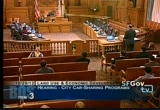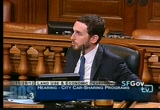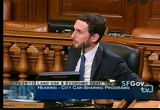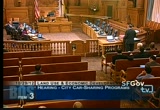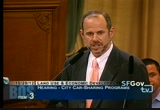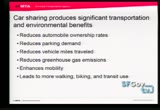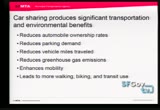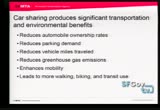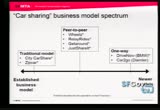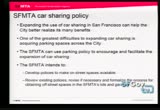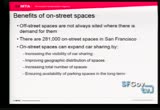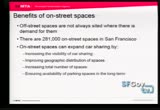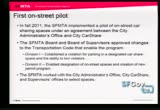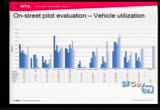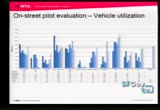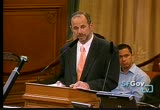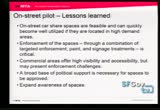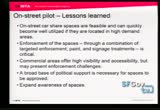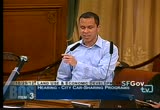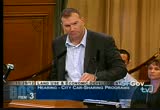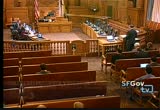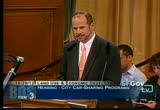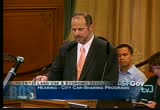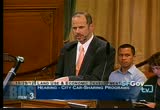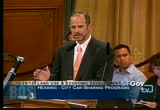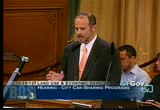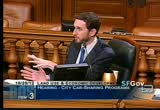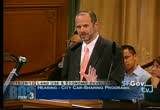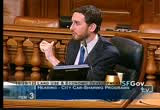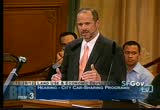tv [untitled] October 29, 2012 7:30pm-8:00pm PDT
7:30 pm
>> supervisor wiener, did you have a comment? supervisor wiener. >> thank you, and thank you, supervisor cohen, for calling a hearing on this very important subject, specifically car sharing. and i agree that it's extremely important that we provide car-sharing access in all parts of the city. and thankfully, particularly for those areas that are poorly served by other forms of transportation such as muni and taxicab service. and we do know that in some areas of the city, in particular districts 10 and 11, muni access is not as good as it is in other parts of the city, and cab access, taxicab access is at times [speaker not understood] nonexistent. so i think it is very important to provide this opportunity. but also backing up and look at this from a systemic
7:31 pm
perspective, i said this before and i'm going to keep saying it because i think it's true, that if we truly want to be a transit-first city, muni is never going to be enough. even if we had another $100 million a year to invest in making muni the kind of service that we all want it to be in terms of reliability and consistency, it would never meet all of the transportation needs of our citizens and our visitors. and if we truly want to see significant movement in terms of reducing the number of private car people make, in terms of getting people able not to have private vehicles to actually give up those vehicles, we have to have, number one, a reliable cab service which right now we don't have in san francisco. and number two, we have to have very, very robust car sharing. and that means traditional car sharing and the newer kinds of car sharing that we're seeing. and we need to make sure that
7:32 pm
the regulatory scheme actually supports that. and right now we're seeing some car sharing services that are experiencing problems with the california p.u.c. we need to make sure those services have a path to being acknowledged as legal and appropriate. we also need to make sure that we're creating enough spaces for our car sharing service providers. we're seeing in some parts of the city with the disappearance of gas stations and disappearance of surface parking lots with some of the most productive ways of providing car sharing spots that it's becoming harder and harder for car sharing companies to actually find spots. and i commend mta for its on-streetcar sharing program. i think that could be terrific. i think we have a ways to go before we can get there. i also have legislation pending to amend the planning code,
7:33 pm
take away right now the disincentive we have to apply the developers to put adequate car sharing spaces in their developments. we actually make it extremely hard, particularly for smaller development to put car sharing spaces in their buildings. this legislation we're sponsoring will address that problem. i make these remarks to get the broader context and supervisor cohen, thanks again for calling this hearing. >> thank you. good afternoon, chairperson mar, members of the committee. i'm mitt rifkin, transportation director. and i concur with you this is an exciting and important topic. i'm sure the reruns of the hearing will be -- will go viral at some point as people catch on to how exciting car sharing can be. i think -- i appreciate your opening remarks because i think they're a good lead-in into car sharing and how it really is an important part of the transit first policy and making that
7:34 pm
real in san francisco, a policy i'll mind you was adopted by the board of supervisors in 1973. so, i have a brief presentation i'm going to walk through. i am joined by melanie, director of department of environment. there are other representatives from the mta department of environment city administrator's office, car sharing organization. we're certainly working along with all of them, working side by side with the department of environment in particular in making sure that the policy is advancing both our transportation and environmental goals, which i believe car sharing is a good example of that. so, if we could go to the presentation, i'm just going to try to walk through briefly some basics to help stimulate the conversation and answer some of the questions that you raised in your opening statement, supervisor cohen. so, car sharing does have a definition currently in the transportation code. this is it.
7:35 pm
i won't spend time on this, but just want to frame at least from the transportation code, current perspective of what the definition of car sharing is. and this largely is in line with the more traditional car sharing models and this is how the code currently defines it. so, i think you've already started speaking to this, but there are significant transportation and environmental benefits from car sharing. perhaps at the top of the list is the potential and i think actuality it has in reducing automobile ownership rates. you may hear stats from others. i've heard that a single car-share vehicle can reduce up to 15 privately owned vehicles. when you think of what that can mean if you multiply it out in a dense city like ours, that could have pretty significant benefit in itself just in terms of needing to be fewer cars in san francisco.
7:36 pm
because it does take all those cars off the street. it reduces parking demand. it also reduces vehicle miles traveled because the data shows that people who rely on car share to do their auto-oriented travel do much more via transit, via cycling, via the other modes of transportation than driving. so, it would be a reduced vmt benefit. and if you put together the reduced number of vehicle miles traveled that car share seems to support, along with the fact that the car share vehicles tend to be greener, that's where you really get some significant environmental benefit in term of reduced greenhouse gas and other emissions. it does, car sharing enhances mobility and contributes to more walking, biking and transit use because people -- and i may be a poster child for this. i am able to live -- my family
7:37 pm
and i are able to live in san francisco without owning a car because of the existence of car sharing. and, so, because we don't need a car, because of the existence of car sharing, we generally rely on transit. for me, i ride my bike a lot. sometimes we take taxis. we often walk to where we're going. but the fact we don't own a vehicle means we're less inclined to just jump in our vehicles for times when we might not otherwise need it. when we do need to drive our own car, we get a car-share vehicle. so, i think if i may be so bold as to say that kind of use epitomizes ways in which car sharing, the existence of car sharing really has very tangible benefits to the transportation system and to the natural environment. so, supervisor wiener made some reference to the fact there are different types of car sharing. this is a spectrum that has the
7:38 pm
traditional model such as we have here in the city on one end of the spectrum. there are peer-to-peer models that have developed over the last year or so, some of them have been around perhaps a little bit longer. the traditional models have been around for nearly a dozen years in san francisco. the peer-to-peer models where individuals are basically making their cars available for others to use. and then the even newer one-way models that are coming into being. we know a lot more about some of the benefits that i just spoke to really pertain to the traditional models because that's what we have understanding and data from. we have much less, if any, on some of these newer models. but it's likely that at least some aspects of the benefits that come from car sharing may be realized by different [speaker not understood] of the
7:39 pm
traditional models. so, our approach to car sharing reflects the understanding that it does advance the city's transit first policy. it also reflects the fact that it's largely a private sector activity, therefore it's one that's for very small, if any investment from the public sector, we get all those significant transportation and environmental benefits. so, it's something that we want to embrace and facilitate. supervisor wiener made reference to the fact that parking is a big issue with regard to car sharing and parking is something that we regulate. so, that's a part of the equation where the sfmta can be helpful in either passively or actively facilitating more car-sharing. and you may hear also from the car-share companies that when they come to speak, that parking is a significant challenge and it's why they often hit roadblocks. so, where we can -- one way
7:40 pm
that we can best work to facilitate car sharing is by using parking policy to make more parking available for car sharing vehicles which in turn would make more car sharing available to members of the public. so, we are looking at our current parking policies, both on-street and off-street. and i'll speak to some of that as we walk through this. in terms of on-street spaces, there are some perhaps unique benefits to on-street spaces. off-street spaces are acquired by or access to them is acquired by the car-share companies based more or lesson the availability of who has space and is willing to lease, or it could be by requirements that are in the planning code. as supervisor wiener mentioned, one of the big down sides is those spaces can go away as
7:41 pm
they are in certain neighborhoods. we do, however, have a lot of on-street spaces, more than 2 80,000 of them that, while there is some fluctuation in those spaces, generally they're not going to go away. some other benefits of on-street parking for car share vehicles is that it increases the visibility. there's a lot more ability to distribute them equitably and where the demands are, that there's a lot more [inaudible] available. and the availability in the long-term because they're not as susceptible of going away as they are lease space in a former garage station site, that they're perhaps more sustainable in the long run. so, for that reason we undertook an on-street car sharing pilot. i guess about a year ago we took exchanges from the fmta
7:42 pm
board and [speaker not understood] to change divisions 1 and 2 of the transportation code to enable car share parking. and then we worked with the city administrator's office, city car share, which is one of the two traditional car share companies operating in the city, as well as members of the office of the board of supervisors to identify spaces. there are other on-street models out there. washington, d.c. and portland being some. our pilot was to see how it would work here. there is a whole process that we, as we do for most uses on the street, took the pilot spaces, too. i won't go through these all, but just to say there was quite a bit of vetting. not originally proposed space made it through. a lot of opportunity for public comment as it relates to san francisco, to make sure that we were being thoughtful in terms of placing these.
7:43 pm
so, here you can see graphically where we ended up putting spaces. they went in in a few phases, starting in september of last year through february of this year. there were 12 in all scattered somewhat throughout the city. so, one of the goals of the hearing was to discuss results. the two main measures by which we evaluated the pilot, the first was vehicle utilization. and this chart shows over the months just the percentage of time the vehicle was in use. you could see it's fairly mixed. there were some that were very heavily used. there were some that were much less used. there were some that started strong and dropped off. that picked up later on. the highest utilization were greenwich, valencia 17th, clay fillmore, [speaker not understood], fourth and clement. so, even in some of those
7:44 pm
spaces there were some issues, which i'll touch upon some challenges which, again, the purpose of the pilot to identify what some of those would be. the other measure we looked at -- oh, i should mention when you're looking at this chart, you'll see a bar going across. and that was basically a control group of off-street spaces that also i think somewhat comports with industry averages or where we'd want to be. you could see some of them hit that bar right off the bat. some of them were approaching it. some were quite a bit away. similarly on this chart, this is looking at unique users, another measure that the industry looks at. generally we found that there was where you had high utilization, you had a number of high users. the purpose of this is to see how broadly based these spaces are being used and whether it's just one or two people using it. >> excuse me for a second.
7:45 pm
could you once again, can you just define how unique users are identified? what's a unique user or who is a unique user? >> so, it's -- looking at the number of people in every given month relative to the total number of trips. so, if there was a space near me and i was using it 50% of the time, then there would be not so many unique users. so, it's a measure of how many different people are accessing that individual vehicle to just two or three people who are using it, or is it wide number or broad number of people. that's what this is measuring. >> [inaudible]. >> sure. so, [speaker not understood]. i think generally what we're pretty happy with the fact i think the general proof of concept, although it has been operating in other places, i think we found that it is certainly feasible. it can quickly become well utilized.
7:46 pm
as i said, some of them were well utilized from the jump when they went high-demand areas. we did have some issues of enforcement of the spaces, particularly the one in the mission and valencia on 1th. we had a lot of people illegally parking there. we did make some changes to try to reduce that. but it's something -- it's a little bit different issue than we have with off-street spaces. so, that's something we need to work upon. there are mitigations such as signage and other things we can do to try to minimize illegal parking of these spaces. * commercial areas are good in terms of visibility and accessability, but also can cause some enforcement challenges. and also going through the process of siting. the spaces, as you know, any discussion of taking the parking space for anything other than general use can be contested. there were some bumps in trying to get some of these, these
7:47 pm
spots cited. so, we need that process and we need to be able to build the support and demonstrate this one vehicle is taking others off the road, i think it will help that process. and then the last point is i think that for those that didn't do as well, it may be partly attributable at least to inadequate outreach and the fact that people didn't know that the space was there and the vehicle was there, maybe didn't know much about car sharing even more generally. i think the places where it did well was often places where there was already strong demand and the vehicle was just filling a gap or filling unmet demand. when going into new places that may not have that kind of latent demand already there, i think there is work to be done by the car share company or by the city, by nonprofit partners to improve -- to get people to understand what car share is and to get to more of a
7:48 pm
critical mass of car sharing use. so, i think that's an important lesson that we learned. >> so, were there -- was there multiple level approach to sharing this awareness, the car sharing of the pilot program? [speaker not understood] in english? >> i don't know the answer to that. i know someone here can speak to how the outreach was done or the pilot. >> [speaker not understood] with the mta. we worked with offices and city administrator offices city car share to select the spaces, city car share can speak to the specific events that they marketed the various [speaker not understood] for that. >> i'm sorry, you work with mta? >> yes. >> and you said you worked with which company? >> city car share and the city administrator's office. -- to select the spaces. >> okay. >> and your office as well. >> right. thank you for that. so, it was all done in english,
7:49 pm
is what you're telling me? >> i'm sorry? >> it was all done in english? >> no, i can't speak to that one way or the other. >> that's my question. if someone can speak to that. >> [speaker not understood] for city car share. >> [speaker not understood]. >> sure. we actually did over 12 different outreaches in the various neighborhoods, particularly in the neighborhoods that had no existing car sharing before. to answer your specific question, we did do an outreach piece in spanish. we did not do one in chinese. we planned to, we wanted to, but did not get one out. we worked with the mayor's mayor's office to get one out. particularly in the mission district we targeted various avenues and developments and that sort of thing. >> okay. thank you. i'm surprised in a city certainly the mayor's office knows how to get things translated. i know the mayor [speaker not understood]. i know there are folks on staff who know how to do that. >> i think that helps support the point, which was one of the lessons learned, that there was much better job that could have been done with regard to
7:50 pm
outreach. so, i think language is probably one dimension of that. i'm sure there are others as well. but that's i think an important take-home from this. >> supervisor wiener has a question, i believe. >> this is with regard to a few different questions with regard to areas you covered. the first has to do with -- it was real a good chart in of the differentxv of car sharing. i know you're aware of the challenges that some of the more innovative car sharing peer-to-peer kind of services are having with the california puc. and i'm hoping that can be worked there and the cpuc will be cooperative on the task forward. i would just like to be assured that the mta is supportive of having all sorts of different kinds of car sharing approaches and that the mta will -- i
7:51 pm
mean, you have to enforce the laws. but in terms of making sure that we can have different kinds of approaches to car sharing and not just have sort of a reactive. this doesn't fit into current models we have there for, we have to shut it down. >> okay. so, i want to make sure what kind of parceling out some of these different kinds of vehicle services. so, there are peer-to-peer car sharing where people maybe have a car in their garage and through some website somebody else can access that vehicle when it's free and they come over and they hand off the key and they drive off. so, it's kind of like an informal version of the traditional model. when you're done, you return it back to that spot and they use different website platforms or maybe apps to make those connections. those are really kind of
7:52 pm
outside of our regulatory sphere. i don't think, and i don't believe that the cpuc has -- i think it's outside of theirs as well. there are one-way car sharing models that there's one here that is using off-street spaces. i think the city has been, you know, is aware of and i think happy to see the increase in the [speaker not understood] infrastructure that they're bringing to the stable. -- table. there is another model i'm sure they're going to speak to today that is perhaps more of an on street version of that. what i was going to get to in a slide or two is that we look forward to figuring out how we can see if we can make some of those work. it seems that there may be places where some of these are not consistent with our parking policy and we just want to make sure that we can resolve areas
7:53 pm
where there are inconsistencies where we don't have different types of rules for different people at least without policy justification for doing that. again, i don't think the cpuc has any jurisdiction there or any concern. what we're really eager to see is some data to confirm that the benefits or pilot to test the benefits that we see in the traditional models would hold and the one-way model. then there's the other realm of maybe what you're talking about more akin to taxi services. and that is where the cpuc has issued cease and desist orders on a number of companies that are acting not really as car sharing, but more as taxi. that's really outside of the realm of what we're talking about here with the different type. there are cpuc [speaker not understood] vehicles and there are some that are not, having
7:54 pm
private people. and those are i think within their regulatory realm. i'd say we have -- i have different perspectives on each of those different types. what i do get is that they're filling a void that is created by our current taxi industry. our primary focus is not going to be fighting anybody who is coming in to fill that void. our primary focus is going to be to improve taxi service in san francisco, to obviate the need for those services or at least compete with them. the types of services that are using licensed vehicles and drivers, while they are operating much like taxis, but with a much less burdensome regulatory framework, while i don't think that's really sustainable in the long term, they are operating with some regulatory framework. with the other ones that don't have any regulations to address
7:55 pm
public safety or equity of access, geographically a-d-a, all the things we have in our transportation code that we place on the taxi system for a reason, including the environmental benefits of our having the greenest fleet in the country, those are a little bit -- are unknown. we have no data, no visibility into them. they are operating completely absent any regulatory framework. so, there's where we're really trying to get more information on. all of that is outside of what we're talking about here in terms of car sharing. >> actually, i think that there's a spectrum and some things there might be gray areas about what is taxi service, what's sort of like taxi service, what sort of then leads into car sharing. so, i think it is actually a spectrum. i'm just trying to make sure when we're reviewing how people get around in the city, the
7:56 pm
challenges around public transportation and a traditional taxicab and we're not looking at it -- this bucket or that bucket. if it doesn't fall into one of our currently existing classifications, that means it must be something wrong with it. i'm not saying you have this attitude. i just want to make sure that the agency doesn't develop this attitude. we need to be encouraging innovation in this area. and i've also noticed that an unfortunate dynamic -- this isn't true of all taxi drivers in san francisco, but some who view any other transit options -- and i won't name specific companies -- that's competition, so we have to kill it and then resist adding any new taxicabs, provide adequate service. so, that's really my larger point that we embrace these new kinds of innovative approaches to transit [inaudible]. >> absolutely. and to the extent that the innovations are advancing the city's policy goals and doing a
7:57 pm
way that's safe, we absolutely want to embrace them. there may be some innovations that don't meet those criteria that we may want to try to steer in a different direction or bring them into a framework that is safe in meeting the other policy goals. there's a lot happening out there, both in the car-sharing realm and in the taxi-like service realm and we're not doing a knee jerk, not within our current understanding of a frame. therefore, it's no good. >> and then the last thing i wanted to ask is about the on-streetcar sharing. -- on-street car sharing. there is i robust on street car sharing service throughout the city which is important to car sharing. i think [speaker not understood], you mentioned this in a very polite way, that
7:58 pm
they're just taking one on-street spot and converting it to a car sharing spot can turn into just a neighborhood brawl. when we had to find one spot in glenn park in my district to use for car sharing, it was very, very challenging. just to find one spot. and we know that to have a truly robust on street car sharing program [speaker not understood]. do you have any political support to get that higher number of on street [speaker not understood]? >> that's a a good question. i think that the more data that we have where we can demonstrate clearly the benefits and demonstrate the reduction of vehicle, reduction of demand for existing constrained parking out there that car sharing has the potential to bring, that's probably our best argument. you give us this one space in your neighborhood and you're
7:59 pm
going to have fewer cars on your street. it actually can be a solution to a parking problem. so, kind of flipping the understanding of it's not just taking a car space or parking space away, but it's potentially freeing up parking because people aren't going to need to have their cars in that area. that's where we need to go. but as you know and as i've said, taking away a parking space is always going to be a challenge. so, the better we're able to articulate those benefits and clearly demonstrate this based on this pilot, the better success i think we'll have. >> thank you. >> so, just a couple more if you want me to kind of finish here. that does segue nicely into the fact that on street is not the only solution. i know supervisor wiener made reference to the legislation that he's offering to try to take advantage of development that could
112 Views
IN COLLECTIONS
SFGTV: San Francisco Government Television Television Archive
Television Archive  Television Archive News Search Service
Television Archive News Search Service 
Uploaded by TV Archive on

 Live Music Archive
Live Music Archive Librivox Free Audio
Librivox Free Audio Metropolitan Museum
Metropolitan Museum Cleveland Museum of Art
Cleveland Museum of Art Internet Arcade
Internet Arcade Console Living Room
Console Living Room Books to Borrow
Books to Borrow Open Library
Open Library TV News
TV News Understanding 9/11
Understanding 9/11